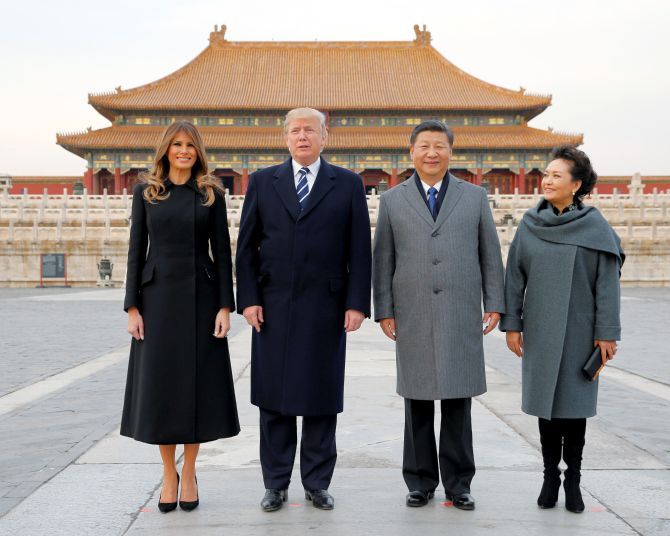'Xi's assumption of absolute power is neither complete, nor irreversible.'
'Nor is it safe, for Xi, for his party, or for his country more generally.'
'And the government knows this,' says Mihir S Sharma.

The Chinese have a phrase describing the transfer for power: 'The Mandate of Heaven'. A ruling emperor has the Mandate of Heaven; at some point it passes on to another Son of Heaven, and temporal power with it.
The slightly unfortunate thing for those terrestrial beings who have to deal with the transfer of power in real-time is that they may not always be sure if the mandate has stayed put or moved on at any given point.
But, of course, the advantage of thousands of years of recorded history is that you can afford to ignore minor inconveniences of that sort.
The notion of a such an uncontrollable, extra-terrestrial mandate is extraordinarily useful. It allows the fabrication of the illusion, for example, that China has always been one, undivided, through those thousands of years with a particular single central authority possessing the Mandate of Heaven at any time.
Of course, it has the wonderful property common to all justifications of power that they tend to justify the possession of power by those who happen to possess it right now.
But it also allows for the creation of a sense of inevitability around the rise of an emperor, and gives to his efforts to centralise power in his hands a certain mythic potency.
In recent history, the Mandate of Heaven has settled ever more firmly around the shoulders of Xi Jinping. He now wears it more surely than any ruler at least since Mao Zedong -- and perhaps more even than the legendary chairman, who fought off multiple challenges to his authority.
When news first broke that the Second Plenum of the Chinese Communist Party Central Committee declared that Deng Xiaoping's rule about the retirement of leaders would now cease to apply, it managed to startle many observers. But, just a few days on, it has the air of inevitability.
Such is the power of the Mandate of Heaven.
But myths are just myths, and Xi's assumption of absolute power is neither complete, nor irreversible. Nor is it safe, for Xi, for his party, or for his country more generally. And the government knows this.
Reports from within the People's Republic of China have stressed that the ministry of public security is extra paranoid about public opinion surrounding these proposed changes to the constitution.
Some dissidents have told The Wall Street Journal that they were interviewed about their views on the issue even before it was made public. Lawyers have been threatened with disbarment if they express negative views about the constitutionality of the move.
Ordinary residents of the mainland discovered that their own, less theoretical views on the change were also facing more-than-usually fearsome online censorship.
Phrases such as 'Long Live the Emperor' or 'Ascend the Throne', and -- amusingly -- 'Live Forever and Never Grow Old', a common Mandarin proverb that is associated with peanuts. The sounds in the language for the nut and the proverb are similar.
A similar banned homonym: 'Board the Plane', which sounds like 'Ascend the Throne'. Also banned were promises to turn vegetarian, after a line in a popular historical anime drama in which a Buddhist empress swore off meat in return for an emperor's death.
Let nobody say the men who man the Great Firewall do not work hard, or that they lack imagination: Even the letter 'N' was censored for a while, for fear that the phrase 'N>2, where N=number of Xi terms' might trend.
Nor could you search for how to emigrate, which apparently was a large number of Chinese citizens' first thought on hearing the news.
Of course, one of the first searches banned was 'Disney', because the most dangerous character in the People's Republic at the moment is Winnie the Pooh, used as a satirical stand-in for Xi.
In other words, Xi's rise to life-long power is known and understood to be risky.
For us on the outside, the People's Republic is the 21st century template for authoritarianism; but we more fortunate individuals in freer countries fail to understand that those who live in more constrained circumstances hold on to their remaining rights and expectations of responsibility ever more fiercely.
The more authoritarian you are, the more you should fear diminishing your people's rights.
In mainland China, the change of views and attitudes that came with the decadal change of leadership was a vital residual form of accountability -- and that has now been taken away.
Crowned heads -- or in Chinese terms, those that wear the Imperial yellow -- can never rest easy.
Nor will the People's Republic more generally feel safe about this change.
Under Deng Xiaoping, a complex power-sharing arrangement at the top of the Communist party -- between generations, regions and factions -- came into being. This allowed for stable transitions and for multiple points of view. It minimised the chances of disastrous and arbitrary policy choices such as marred Mao's rule.
There was a degree of meritocracy, subject, of course, to strict political control. This system has been systematically undermined by Xi since he took power; he has just taken the final obvious step.
It is possible that we will date the end of Communist China's golden age from this week.












 © 2025
© 2025